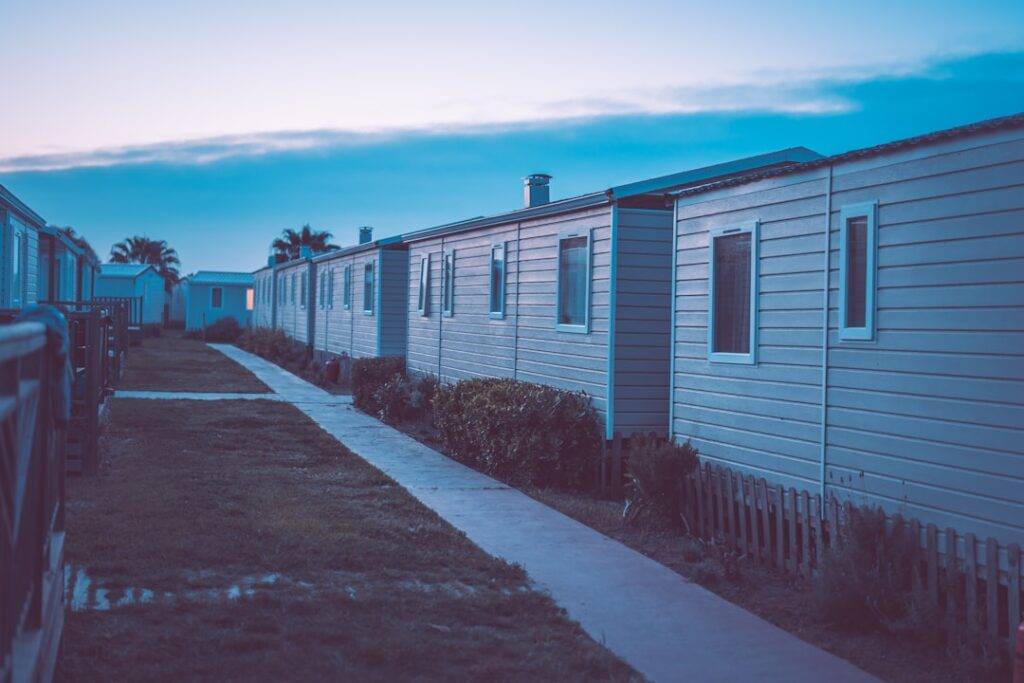Understanding the Mobile Home Park Housing Model
Mobile home parks, more formally known as manufactured housing communities, represent a critical and often misunderstood segment of the American housing market. They offer an affordable path to homeownership through a unique housing model that separates the ownership of the home from the ownership of the land it occupies. This structure, known as a land-lease community, provides a hybrid approach that blends elements of both renting and owning.
Here’s a more detailed breakdown of the basic framework:
- Ownership Model: The core concept is that you purchase and own the physical manufactured home, but you lease the plot of land, or “lot,” on which it sits from the park owner. This makes the home personal property (chattel), much like a vehicle or boat, rather than real property. This distinction has significant implications for financing, taxes, and appreciation.
- Monthly Costs: The primary ongoing expense is the monthly lot rent, which can range from as low as $300 in some rural areas to over $1,000 in high-cost coastal markets. This fee covers the land lease and typically includes access to community amenities and services like trash collection and sewer. In addition to lot rent, you are responsible for all the standard costs of homeownership, including your home loan payment, property taxes on the structure, insurance, and utilities.
- Community Living: A major draw for many residents is the built-in community. Most parks provide shared amenities that foster social interaction, such as clubhouses, swimming pools, playgrounds, and fitness centers. Many also organize community events, from potlucks and holiday parties to hobby clubs. This can create a close-knit, neighborly environment that is less common in traditional subdivisions.
- Affordability: The most significant advantage is affordability. With the median price of a traditional site-built home soaring, manufactured homes offer a much lower point of entry. A new manufactured home can cost between $70,000 and $150,000, plus the cost of installation, while used homes can be purchased for significantly less. This makes homeownership accessible to a wider range of people, including young families, retirees on fixed incomes, and low-to-moderate-income workers.
- Demographics: The residents of mobile home parks are incredibly diverse. They include young families starting out, single professionals, and, most notably, a large population of seniors. Many parks are specifically designated as active 55+ communities, offering a quiet, adult-focused environment with tailored social activities. These communities provide an essential source of affordable housing for retirees.
Modern mobile home parks have largely shed the outdated “trailer park” stereotype. Today’s communities are often well-planned, with resort-style amenities and high-quality homes that are nearly indistinguishable from site-built houses. This model creates a vital middle ground between renting an apartment, where you build no equity, and buying a traditional home, which is financially out of reach for millions. However, this choice involves a unique set of trade-offs that prospective buyers must carefully weigh, from the financial realities of lot rent and depreciation to the social constraints of park rules.
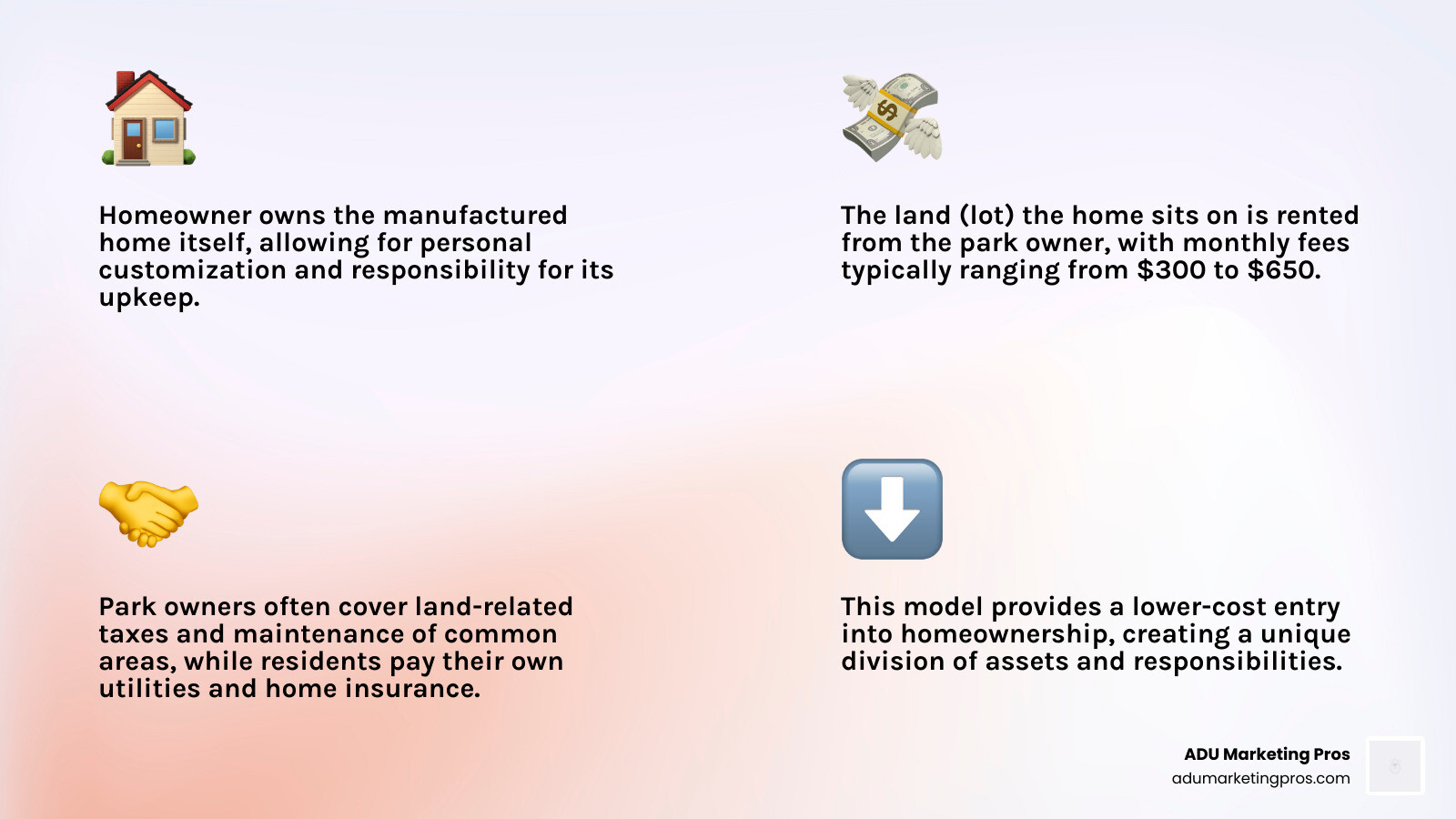
The Appeal and Reality: Pros and Cons of Park Living
Living in a mobile home park offers a unique lifestyle defined by a compelling mix of financial benefits and significant challenges. To make an informed decision, it’s crucial to look beyond the sticker price and understand the day-to-day realities of this housing choice.
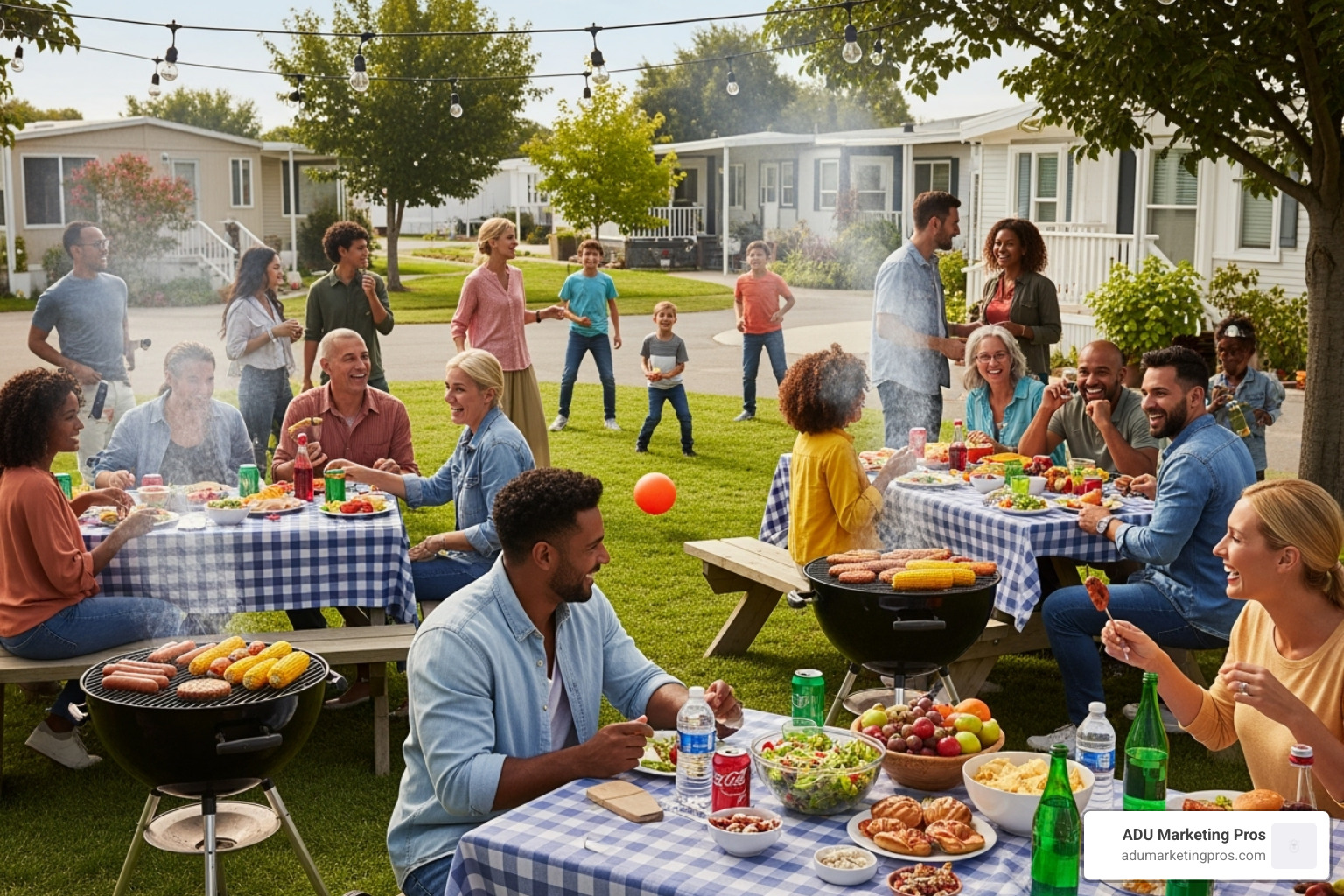
The Upside: Affordability and Community
The primary draw of mobile home parks is undeniable: affordability. In a housing market where traditional homeownership is increasingly elusive, manufactured housing provides a viable alternative.
- Lower Upfront Costs: According to the Manufactured Housing Institute, the average sale price of a new manufactured home is a fraction of the cost of a new site-built home. A new single-section home averages around $86,000, while a multi-section home averages about $158,000. This dramatically lowers the barrier to entry for purchasing a home.
- Reduced Monthly Expenses: Even when factoring in lot rent, the total monthly housing cost—including the home loan, lot rent, utilities, and insurance—is often significantly lower than the mortgage payment on a comparable traditional home or even the rent for a similar-sized apartment in many markets.
- Close-Knit Community: Many residents deeply value the social fabric of park living. The shared spaces and organized events, such as holiday parties, community barbecues, and game nights, create a neighborly environment where people know and look out for one another. This can provide a strong sense of belonging and security.
- Low-Maintenance Lifestyle: The park management is responsible for the upkeep of all common areas. This includes landscaping, road maintenance, snow removal, and the management of shared amenities like pools and clubhouses. This frees residents from many of the yard work and maintenance burdens associated with traditional homeownership.
The Downside: Costs and Constraints
Despite the benefits, there are significant challenges and risks that every potential resident must consider.
- Rising Lot Rents: The most significant ongoing expense is the monthly lot fee, which typically ranges from $300 to $650 but can exceed $1,000 in desirable locations. These fees are not fixed and often increase annually to cover the park owner’s rising costs (like property taxes and maintenance) or simply to increase profits. These incremental increases can strain budgets over time, especially for those on fixed incomes.
- Home Depreciation and Equity: A major financial consideration is that manufactured homes on leased land typically depreciate in value. Because the home is personal property and you don’t own the land—the component of real estate that traditionally appreciates—you are not building equity in the same way as a traditional homeowner. Research from sources like Bloomberg has highlighted how this model can hinder wealth building over the long term.
- Strict Park Rules: Life in a manufactured housing community is governed by a detailed set of rules and regulations. These rules dictate nearly every aspect of your property, including exterior paint colors, the size and type of sheds or decks you can build, landscaping choices, pet ownership (size, breed, and number), and parking for vehicles and guests. While these rules are intended to maintain community standards and property values, they can feel highly restrictive and infringe on your sense of autonomy as a homeowner.
- Vulnerability of Rented Land: The fact that you don’t own the land creates a fundamental insecurity of tenure. If the park owner decides to sell the land for a more profitable redevelopment project, residents can be displaced. Moving a manufactured home is an expensive and logistically complex process that can cost upwards of $10,000-$15,000, and many older homes are not structurally sound enough to be moved at all. This leaves residents in a precarious position, potentially forced to abandon their home or sell it for a fraction of its worth.
Decoding the Costs: What You’ll Actually Pay
To determine if mobile home park living is financially sustainable for you, it’s essential to move beyond the attractive purchase price and create a comprehensive budget. Understanding the full spectrum of costs involved is the key to avoiding financial strain and making a sound investment in your housing future.
Lot Rent (or Pad Rent)
Lot rent is the single most significant ongoing expense unique to this housing model. It is the monthly fee you pay to the park owner for leasing the land your home occupies. The amount can vary dramatically based on several factors:
- Location: Parks in major metropolitan areas or desirable coastal regions (like California or Florida) command much higher rents than those in rural or Midwestern states.
- Amenities: A park with resort-style amenities like a heated pool, a modern fitness center, tennis courts, and a large clubhouse will have higher lot rents than a basic park with no frills.
- Included Services: The rent typically covers the land lease, access to amenities, and often basic services like trash removal, water, and sewer. However, you must always confirm exactly what is included. In some parks, water and sewer are sub-metered and billed back to the resident separately.
Before signing a lease, it is crucial to inquire about the park’s history of rent increases. Ask the manager for the percentage increase over the past five years. A history of steep or unpredictable hikes is a major red flag. The lease agreement itself should be scrutinized for clauses related to rent increases, the length of the lease term, and the process for renewing.
Homeownership and Property Taxes
The tax situation in a mobile home park is unique. Since you own the home but not the land, the tax liability is split. The park owner pays property taxes on the entire parcel of land, and you pay taxes on your home structure. In most jurisdictions, a manufactured home on a leased lot is classified as personal property, and you will receive a separate tax bill for it from the local municipality or county. The tax is based on the assessed value of your home.
When you buy or sell a home in a park, the annual taxes are typically pro-rated between the buyer and seller. It is your responsibility to file a change of ownership report with the local assessor’s office to ensure tax records and future bills are accurate. In some states, it’s possible to have a manufactured home retitled as real property if it is permanently affixed to a foundation on land you own, but this is not applicable in a land-lease community.
Other Potential Expenses
Beyond lot rent and property taxes, you must budget for a variety of other costs that are part of being a homeowner:
- Separate Utility Bills: While some utilities may be included in the lot rent, you will almost certainly be responsible for your own electricity, natural gas or propane, internet, and cable TV bills.
- Home Insurance: A manufactured home insurance policy (often called an HO-7 policy) is essential and almost always required by the park and your lender. This policy protects your investment against damage from fire, wind, and theft, and also provides liability coverage. Flood and earthquake coverage typically require separate policies.
- Maintenance and Repairs: As the homeowner, you are responsible for 100% of the upkeep of your home and your specific lot. This includes everything from interior appliances and plumbing to exterior maintenance like roofing, siding, and skirting. Manufactured homes have unique maintenance needs, such as periodic re-leveling and ensuring the tie-downs and anchors are secure.
- Special Assessments: While less common than in condominium associations, some park leases allow the owner to levy special assessments on residents for major capital improvements that benefit the entire community, such as repaving roads or replacing the main sewer lines. Always ask if there are any planned assessments before you buy.
Finding Your Fit: Choosing the Right Mobile Home Park
Choosing the right mobile home park is as important as choosing the right home. You are not just buying a structure; you are investing in a community and a lifestyle. A thorough due diligence process is essential to ensure you find a park that is well-managed, financially stable, and a good fit for your personal needs.
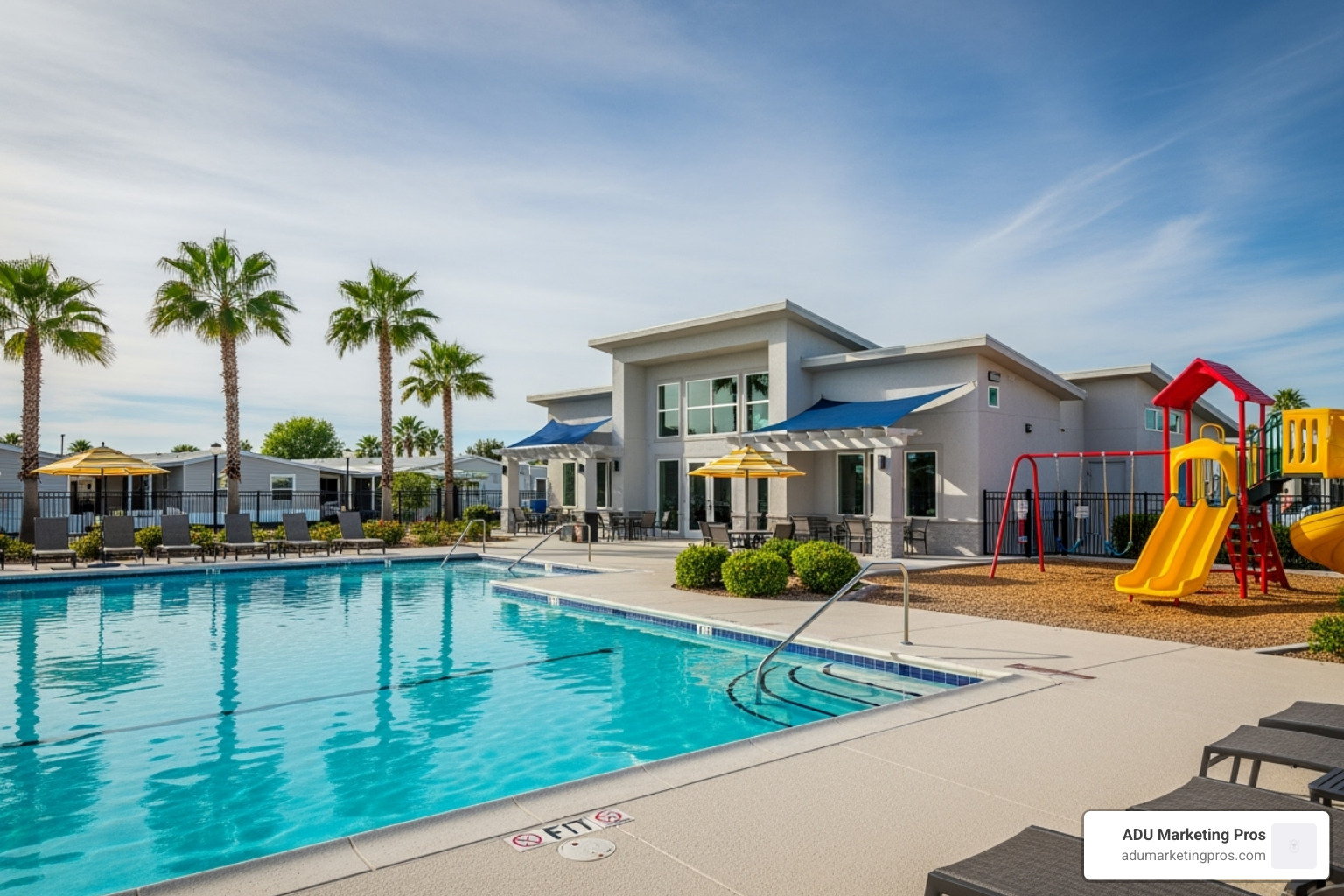
Location and Demographics
First, narrow down your search based on location. Consider your daily life and priorities. How long will your commute to work be? If you have children, what are the local schools rated? How close are essential services like grocery stores, healthcare facilities, and public transportation? Decide whether you prefer a park in a bustling urban area with easy access to city life or a quieter, more spacious park in a rural or suburban setting.
Next, consider the park’s demographics. Communities generally fall into two categories: all-ages family parks or age-restricted 55+ communities. Family parks will have amenities like playgrounds and a more lively atmosphere, while active 55+ retirement communities offer a quieter environment with social activities geared toward seniors. Under the Housing for Older Persons Act (HOPA), these age restrictions are legal. Choose the environment that best suits your stage of life.
Park Management and Rules
The quality of park management is paramount to your long-term happiness. A good manager ensures the park is safe, clean, and well-maintained, and that rules are enforced fairly and consistently. Before committing, schedule a meeting with the park manager. Ask pointed questions about their policies for handling resident complaints, their communication methods, and the history of rent increases.
Most importantly, obtain and carefully read the complete park rules and regulations, along with the lease agreement. Pay close attention to policies that will affect your daily life, such as:
- Property Maintenance: What are the standards for lawn care, home exterior, and landscaping?
- Vehicles and Parking: How many vehicles are allowed per lot? Where can guests park?
- Pet Policies: Are there restrictions on the number, breed, or size of pets?
- Exterior Modifications: What is the process for getting approval for a new deck, shed, or fence?
- Subletting: Are you allowed to rent out your home?
A Due Diligence Checklist
Don’t rush the process. Use this checklist to guide your evaluation:
- Visit Multiple Times: Go to the park on a weekday, a weeknight, and a weekend to get a feel for the community’s noise levels and general atmosphere.
- Talk to Current Residents: This is the most valuable step. Politely approach several residents and ask for their honest opinions about the park. Ask about management, rent increases, and their overall satisfaction. People are often happy to share their experiences, both good and bad.
- Inspect Amenities and Lots: Don’t just look at the list of amenities—inspect them. Is the pool clean? Is the fitness equipment functional? When looking at a specific lot, check for proper drainage, the condition of utility hookups, and privacy from neighbors.
- Review All Documents: Read every word of the lease agreement, park rules, and any other documents before signing. If you don’t understand something, ask for clarification or consult with a lawyer.
- Check Online Reviews: Look up the park on Google, Yelp, and the Better Business Bureau website. While online reviews can be skewed, they can help you identify recurring problems or patterns of complaints.
The Evolving Landscape of Mobile Home Parks
The world of mobile home parks is undergoing a significant transformation. Once viewed as temporary housing on the fringes of society, these communities are now recognized as a crucial component of the affordable housing ecosystem and a major real estate asset class.
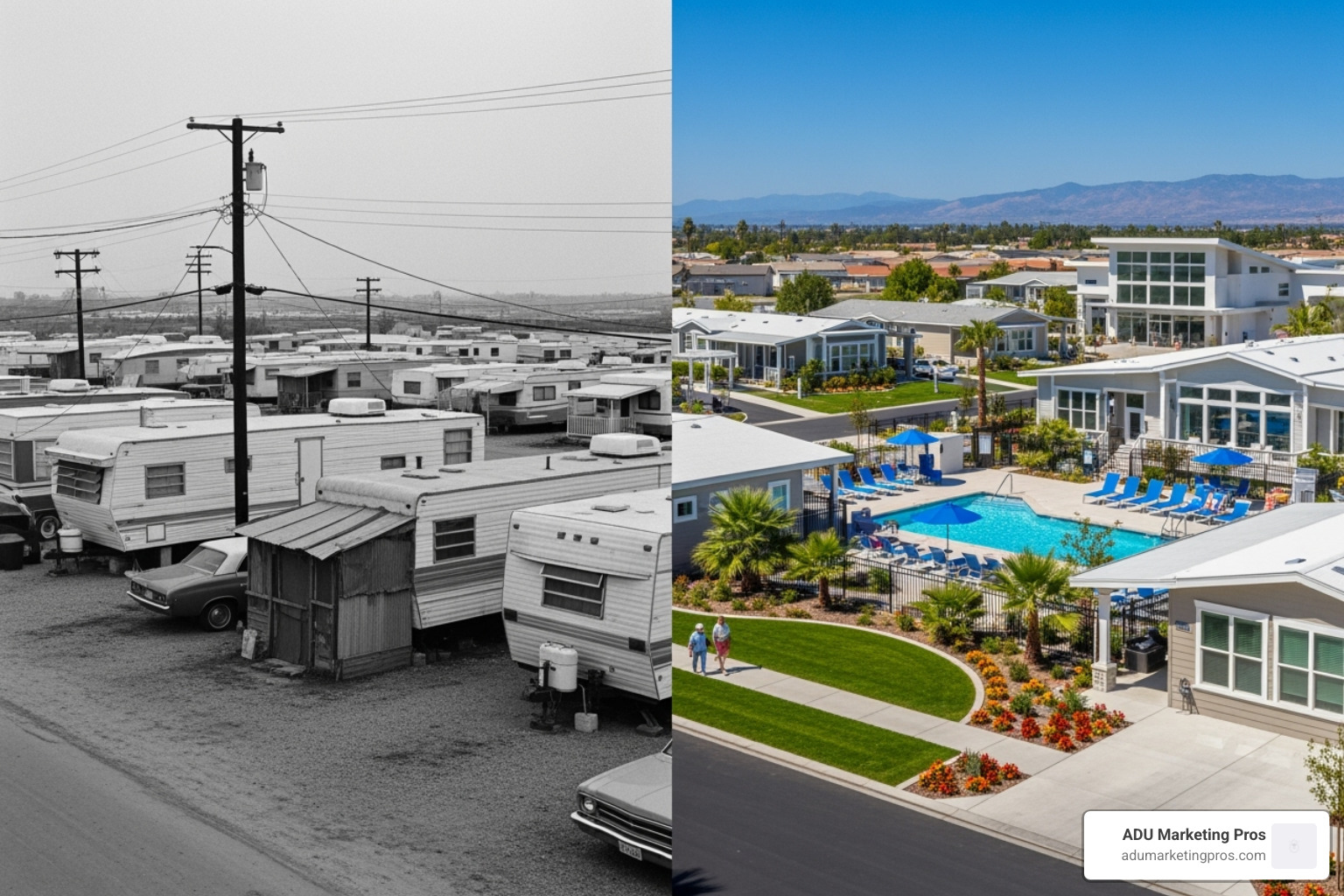
From “Trailer Park” to “Manufactured Housing Community”
The terminology shift reflects a real evolution in quality and perception. The modern manufactured home bears little resemblance to the “trailers” of the past. Since 1976, all manufactured homes have been built to a strict federal building standard known as the HUD Manufactured Home Construction and Safety Standards. This code regulates every aspect of construction, including design, durability, fire resistance, energy efficiency, and overall quality, ensuring they are as safe and durable as site-built homes.
Communities themselves have also evolved. Developers are creating thoughtfully planned communities with high-end amenities that rival those of expensive subdivisions. This evolution has not gone unnoticed by urban planners, some of whom argue that trailer parks offer valuable lessons in urbanism by demonstrating how to create affordable, high-density housing with a strong sense of community and shared space.
The Rise of Corporate Ownership
Perhaps the most significant trend in recent years is the influx of corporate capital. Large institutional investors, private equity firms, and Real Estate Investment Trusts (REITs) like Equity LifeStyle Properties and Sun Communities have invested billions of dollars to acquire parks across the country. They are drawn to the stable, predictable income stream generated by high occupancy rates and consistent lot rent payments.
While corporate ownership can lead to professional management and capital improvements, it has a well-documented dark side. The primary goal of these investors is to maximize returns, which often translates into aggressive rent hikes and increased fees for residents. This business model can threaten the very affordability that makes these communities so essential, putting immense financial pressure on residents, particularly seniors on fixed incomes.
Legal Rights and Regulations
In response to these pressures, many states have enacted laws to provide greater protection for manufactured home residents. These tenant rights acts govern key aspects of the landlord-tenant relationship, including:
- Rent Increases: Requiring a minimum notice period (e.g., 60 or 90 days) for any rent increase.
- Eviction Protections: Defining the specific, limited reasons for which a resident can be evicted (e.g., non-payment of rent, violation of park rules).
- Right to Organize: Guaranteeing residents the right to form a homeowners’ association without retaliation.
Laws are also evolving to address what happens when a park owner sells or redevelops. Some jurisdictions now require extended notice periods or relocation assistance for displaced residents. A growing movement has led to right of first refusal laws, which give residents the opportunity to purchase the park themselves. Organizations like ROC USA (Resident Owned Communities) help residents form cooperatives to secure financing and manage their communities, giving them control over their housing costs and long-term stability.
Frequently Asked Questions about Mobile Home Living
Navigating the world of manufactured housing can be confusing. Prospective residents often have questions about the financial, legal, and practical realities of living in a mobile home park. Here are detailed answers to some of the most common concerns.
Do mobile homes appreciate or depreciate in value?
Typically, mobile homes on leased land depreciate in value. They are legally considered personal property (like a car), and their value decreases with age and wear. The primary reason is that you do not own the land underneath, which is the component of traditional real estate that appreciates most. However, the rate of depreciation is not fixed, and in some cases, homes can retain their value or even see modest appreciation. Key factors include:
- Home Maintenance: A well-maintained home with modern features (updated kitchen, new flooring, energy-efficient windows) will hold its value far better than a neglected one.
- Park Quality and Location: A home in a highly desirable, well-managed park in a strong housing market will depreciate much more slowly. In areas with severe affordable housing shortages, the demand for manufactured homes can sometimes lead to stable or slightly increasing values.
- Market Conditions: In a hot real estate market, all forms of housing tend to increase in value, and manufactured homes are no exception.
While you shouldn’t expect it to be a wealth-building asset like a traditional house, a well-cared-for mobile home can provide stable and affordable homeownership for many years.
Can I get a mortgage for a mobile home?
Yes, but the financing is different from a traditional home loan. Because the home is personal property, you will typically need a chattel loan. These loans are secured only by the home itself, not the land. Compared to traditional mortgages, chattel loans often have slightly higher interest rates and shorter repayment terms (e.g., 15-20 years instead of 30). Lenders who specialize in these loans will look at your credit score, income, and require a down payment, similar to any other loan.
Traditional mortgages are generally only available if you own both the manufactured home and the land it sits on. However, government-sponsored enterprises like Fannie Mae and Freddie Mac have programs designed to make financing more accessible and affordable. Fannie Mae’s MH Advantage® program, for example, offers conventional mortgage financing for qualifying manufactured homes that have features comparable to site-built homes.
What happens if the park owner sells the land?
This is one of the biggest risks of park living. If the owner sells to a developer who wants to close the park, residents face potential displacement. Your rights in this situation vary significantly by state and local law. Most states require a legally mandated notice period, which could be anywhere from 60 days to a year, to give residents time to plan. However, the options are often grim. Moving a home is extremely expensive (often $10,000+) and not always possible for older homes. This can force residents to sell their home for a low price or abandon it entirely.
To combat this, a growing number of states and cities have passed “right of first refusal” laws. These laws give the residents’ association the first opportunity to match a third-party offer and purchase the park themselves, often by forming a resident-owned cooperative. This is the best-case scenario for long-term stability, but it requires residents to be organized and able to secure significant financing in a short timeframe.
What is the difference between a manufactured home and a modular home?
This is a common point of confusion. The key difference lies in the building codes they follow.
- Manufactured Homes are built entirely in a factory under a single, federal building code administered by the U.S. Department of Housing and Urban Development (HUD). They are transported to the site on a permanent chassis.
- Modular Homes are also built in a factory but are constructed in sections (modules). They are built to the same state and local building codes as a traditional site-built home. Once transported to the site, the modules are assembled on a permanent foundation, and they are legally considered real property, financed with a traditional mortgage.
Conclusion: Is a Mobile Home Park Right for You?
Deciding to live in a mobile home park is a significant financial and lifestyle choice that requires a clear-eyed assessment of your personal goals and financial situation. It is not a universally perfect solution, but for many, it represents the most viable—and sometimes only—path to the stability and pride of homeownership.
This lifestyle offers the powerful combination of affordability in an otherwise prohibitive market and a strong sense of community that many modern neighborhoods lack. It allows individuals and families to own their own space without the immense financial burden of a traditional home and property. However, these benefits must be weighed against the considerable trade-offs: the perpetual cost of lot rent that is likely to increase annually, the reality that your home will likely depreciate in value, and the necessity of living under a set of strict park rules that govern many aspects of your life.
If you are seriously considering this path, thorough due diligence is not just recommended; it is absolutely critical. Do not be swayed by a low purchase price alone. You must visit multiple parks, speak candidly with current residents, and meticulously scrutinize every line of the park’s rules and lease agreement. Understanding your legal rights as a resident, especially concerning rent increases and the potential for a park sale, is your best defense against future instability.
Mobile home parks are a vital part of a larger, growing conversation about alternative housing solutions. As the cost of traditional housing continues to climb, innovative models like tiny homes, accessory dwelling units (ADUs), and co-housing are gaining traction. Each of these options presents its own unique set of benefits and challenges, but all share the common goal of making safe, stable housing more accessible to more people.
Ultimately, the best housing choice is the one that provides you with security, fits within your budget, and, most importantly, feels like home. For the right person who has done their homework, a manufactured home in a well-managed park can be exactly that.

